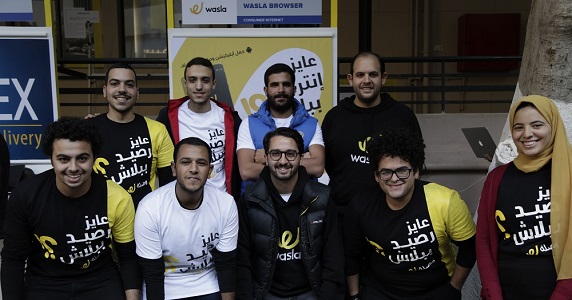Wasla Browser, a search engine created for internet users in the Middle East and Africa, has been launched in Egypt.
Founded by Serag Meneassy, Mahmoud El Said and Taymour Sabry, the web browser which can be downloaded on Google Play Store, was introduced to the public at the 2018 Rise Up Summit, attracting over 2,000 users in under 48 hours.
The creators of Wasla Browser say they’re targeting emerging markets, with a goal of helping millions of people use the internet through mobile phones.
“Our goal is to provide over 500 million people in emerging markets with free mobile internet. There are more than two billion people in emerging markets coming online for the first time through their mobile phones,” say founders.
“We, at Wasla, are building a product that is able to facilitate this ever-increasing need to stay connected through subsidizing user mobile-data costs by leveraging digital advertising.”
Wasla’s target market comprises prepaid smartphone users between the ages of 13-40 which represents the majority of the Egyptian population.
In Egypt, over 97% of households have access to mobile internet, while only 42% have access to ADSL, which leaves almost 55% of households reliant on mobile internet.
The application is currently available for download to only the Egyptian market but the founders say they’ll soon roll out the service to other countries.
How Wasla Browser works
Wasla Browser is an Android-powered search engine that subsidizes user’s mobile data costs by leveraging digital advertising.
After downloading, the set-up process is not different from what you’ve experienced with other browsers like Google Chrome, Internet Explorer, Bing or Mozilla FireFox.
See: Report: Expected 4G vs 5G global penetration by 2025
Wasla Browser ‘gamifies’ the user’s experience by allowing them to freely surf the internet all while completing in-app missions and actions to earn points; which are ultimately redeemable for free mobile data and airtime directly from Wasla’s very own ‘Wasla-wallet’.
Users can use Wasla like any other browser and earn reward points in the process. The browser also comes with a localized homepage in the form of a feed displaying content aggregated from over 200 sources including articles, videos and more.
“We have built a proprietary content aggregator system that matches users interests to specific content. There is also a human element to it with a dedicated content team that supervises, trains and makes sure we are adhering to our strict content guidelines,” Taymour Sabry, a co-founder at Wasla, told MENAbytes in an interview.
Wasla Browers closes funding
Wasla Browser on Wednesday announced that it had successfully secured its first round of funding ( $180,000), comprised of a group of strategic angel investors led by Omar Barakat, with funds allocated towards the launch of the beta testing phase and fueling user growth in addition to building the necessary marketing and technology infrastructure.
See: Why cost of manufacturing a smartphone will rise
The launch of Wasla Browser comes hot on the heels of a recent report by the International Communication Union, which showed that Africa had registered the highest growth in the number of internet users compared to other continents.
Of all ITU regions, the fastest growth was reported in Africa, where the percentage of people using the internet increased from 2.1 percent in 2005 to 24.4 percent in 2018.
In developed countries, slow and steady growth increased the percentage of the population using the internet from 51.3 percent in 2005 to 80.9 percent in 2018, while rates also rose to 54.7 percent in the Arab States and 47 percent in the Asia-Pacific region.
The regions with the lowest growth rates were Europe, with 79.6 percent, and the Americas, with 69.6 percent of the population using the internet.
Related:
Ugandan tycoon Thakkar unveils first African-made smartphone
How to minimize data consumption when using a MiFi

